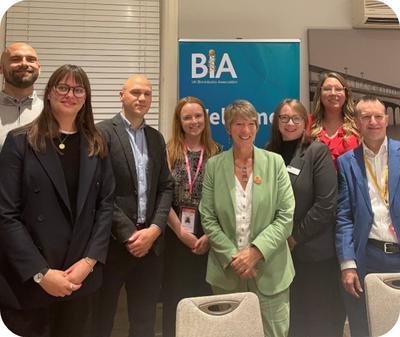BIA on the party circuit: what we heard from the opposition conferences

For the last few weeks, the BIA team has been on the road - from Birmingham to Bournemouth to Manchester - engaging with parties across the spectrum to ensure life sciences and biotech remain central to the UK’s growth story. Each conference offered a glimpse into how the parties are positioning themselves in an increasingly fragmented political landscape, and what it might mean for our sector now and in the long term. In this blog, Maddy Anderson, Policy and Public Affairs Executive, shares her experience.
Reform UK: early days, big claims and a hint of life sciences ambition
He argued that council pension funds should be invested in global equity trackers to save money in fees. This would see the majority of investment go to the big US tech companies due to their dominance of global public markets, potentially drawing investment away from UK companies, although he did say 10% of funds should go into local UK investments.
However, the party’s head of policy, Zia Yusuf, did highlight the UK’s failure to commercialise science and tech due to a lack of growth capital, suggesting that the party sees the need to address our sector’s number one issue. Reform UK Mayor of Lincolnshire, Andrea Jenkyns, also spoke passionately about her county’s strength in agritech and the opportunity to make the UK a science superpower.
The most significant part of the conference for the life sciences sector came not from a Reform UK politician but an invited guest speaker. Dr Aseem Malhotra’s speech from the main stage of the conference hit the headlines after he voiced claims that the Covid vaccine is “highly likely” to have been a factor in members of the royal family developing cancer. He also stated that clinical trials published in journals couldn’t be trusted and accused the pharmaceutical industry of hiding the truth about medicines and vaccines by paying publishers, regulators and the medical profession. Dr Malhotra is advising Robert F Kennedy on FDA policy and was introduced by Party Chairman Dr David Bull as being his co-author for the party’s health policy, so his views will be very significant as the party prepares for the next general election, which leader Nigel Farage believes will come as early as 2027.
BIA engages all political parties to ensure the UK remains a great environment for innovative life sciences and biotech. We’ll continue to follow and engage with Reform UK on behalf of members as they develop their policy platform.
Liberal Democrats: a vision for UK-EU collaboration
During an IFG panel, Clive Jones MP spoke about NHS drug pricing developments and made clear the benefits of fostering a commercial environment that encourages life sciences companies to start, scale and invest in the UK. Other discussions pointed to the potential of mutual recognition agreements with the EU to ease regulatory burdens for new medicines and elevate the UK’s position as a life sciences hub.
The session was chaired by Rosie Lindup, Senior Policy and Public Affairs Manager, and convened Pippa Heylings, MP for South Cambridgeshire, alongside experts from across the charity, medical research and pharmaceutical sectors.
At the Lib Dem Business Day, we took part in a roundtable on supporting innovative sectors of the economy with the Liberal Democrat spokespeople for Science, Innovation and Technology in both the Commons and the Lords, Victoria Collins MP and Lord Clement-Jones. The discussion focused on opportunities to drive forward smart regulation and strategic investment to unlock the benefits of innovation in the UK. We also had the opportunity to speak directly with Liberal Democrat leader Ed Davey about the demand for international talent in UK life sciences.

The Conservatives: A lower-key conference but with strong champions
While the mood in Manchester at the Conservative Party Conference was relatively subdued compared to Bournemouth and Liverpool, the atmosphere at our event certainly wasn’t. We hosted a panel discussion on how the UK can get better at retaining its life science companies.
As George Freeman MP noted, the UK’s world-class science base but tough commercial environment means we act as an incubator for the US, developing technologies that American investors commercialise and profit from. Our panel was united in its diagnosis of the problem: a lack of access to capital in the UK.
Overall, the conference felt much quieter than in previous years, with conversations between panels focused more on the rise of Reform than on plans for the Conservatives to regain power. Speaking candidly, George Freeman MP acknowledged that while the Conservatives remain in opposition, there is little they can do to influence the direction Government takes. He reinforced the importance of developing cross-party consensus to support the life sciences sector, as the last thing industry needs is political uncertainty, adding to the growing list of challenges. Public affairs, much like biotech, can be a long-term game.
Looking ahead: keeping life science at the centre of the conversation
Across party lines, there’s recognition that innovation and life sciences will be critical to the UK’s economic renewal - even if the approaches differ.
BIA will continue engaging all parties to ensure our sector’s voice is represented in emerging manifestos. Whether through early dialogue with new players like Reform, deeper dives with the Lib Dems, or continued partnership with the Conservatives, our goal remains the same: to make the UK the best place in the world to discover, develop and deliver life-changing innovations.




